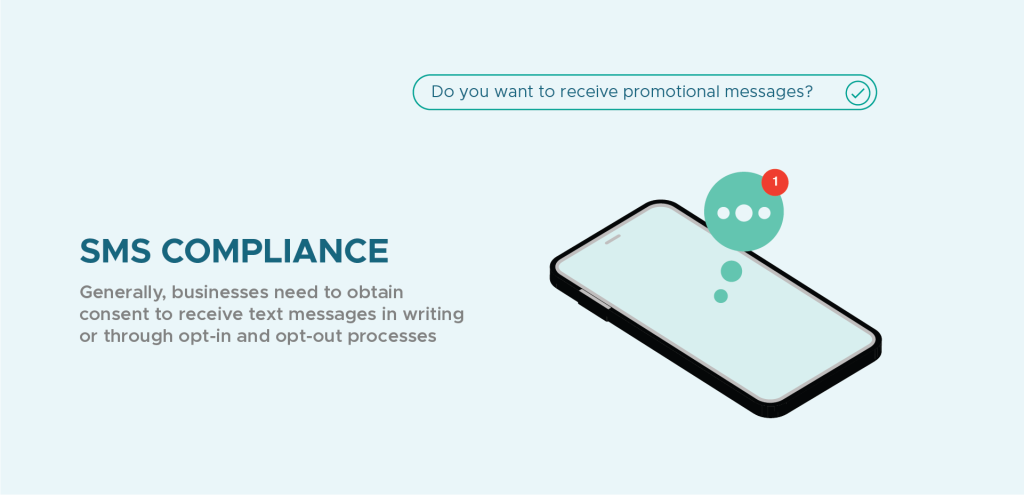SMS (Short Message Service) marketing is a powerful tool for businesses to reach their customers directly and boost sales. However, sending marketing messages via SMS can be a minefield of legal issues. Around the world, SMS compliance laws and regulations protect consumers from unwanted or spammy text messages and ensure that marketers operate fairly and ethically.
If you’re looking to use SMS marketing to drive results for your business, SMS Astral is your ally. With SMS Astral, you’ll have access to all the necessary tools to comply with regulations while building stronger relationships with your customers.
Can a Business Text You without Permission?
The foremost rule of SMS marketing compliance is to obtain explicit and informed consent from customers before sending them promotional text messages. Text message marketing laws vary depending on the country, but generally, businesses need to obtain consent to receive text messages in writing or through opt-in and opt-out processes.
Most countries have their SMS compliance regulations established governing the areas of eCommerce and text message marketing. These laws apply to businesses and private individuals. So even if you plan to send marketing texts as a private individual, affiliate, or influencer rather than as a registered business, you may still be subject to these regulations.
The legal background of SMS marketing compliance
In the USA, the Telephone Consumer Protection Act (TCPA) requires businesses to obtain prior express written consent from customers before sending them marketing messages via SMS. Businesses must obtain a signed agreement or confirmation stating that the customer has agreed to receive marketing messages via SMS.
In addition to the TCPA, there are other SMS compliance laws, such as the CAN-SPAM Act (Controlling the Assault of Non-Solicited Pornography and Marketing Act), which regulates commercial email messages and may also apply to SMS messages that contain marketing content. Furthermore, the American Federal Communications Commission (FCC) has issued regulations related to SMS marketing, which include rules on how to obtain consent, what types of messages are allowed, and what information must be included in the message.
In Europe, the General Data Protection Regulation (GDPR) requires businesses to obtain explicit and informed consent from customers before sending them marketing messages via SMS. In addition to this text message privacy law, European businesses must comply with the ePrivacy Directive (the so-called Cookie Law) when collecting customer data online. It covers obtaining consent for the use of cookies and other tracking technologies, including those used in SMS marketing.
In Asia, different countries have their individual SMS marketing laws. For example, in India, the Telecom Regulatory Authority of India (TRAI) has issued regulations that require businesses to obtain prior consent from consumers before sending them promotional text messages. In China, the Anti-Spam Regulations require businesses to obtain prior consent from consumers and include the opt-out information in their messages.
On the African continent, there are strict regulations governing the use of SMS for commercial purposes varying from country to country. Businesses that violate these regulations can face hefty legal consequences. In South Africa, the Electronic Communications and Transactions Act (ECTA) regulates the use of SMS for marketing purposes, while in Nigeria, the Nigerian Communications Commission (NCC) has established guidelines for commercial SMS messaging.
The SMS Astral SMS Compliance Checklist
Is it Best to Offer Customers Opt-in or Opt-out for SMS compliance?
Carefully consider all options and their potential impact on customers when offering opt-in or opt-out options for your SMS marketing strategy. Generally, it is best to offer opt-in options rather than opt-out options. Opt-in options require customers to actively choose to receive marketing messages, which helps ensure that businesses only send messages to individuals interested in receiving them.
Opt-out options, on the other hand, offer customers to take action to stop receiving messages. There may need to be more than just offering opt-out options to build customer trust and maintain a positive reputation. Customers may still perceive mere opt-out messages as intrusive or spammy, harming their relationship with your business. Moreover, in the United States and Europe, opt-in consent is required by law for SMS marketing.
Provide Clear Opt-Out Instructions
While it is generally best to offer opt-in options for SMS marketing, there may be some situations where offering opt-out options is appropriate. If your business already has a relationship with a target group and you have previously obtained consent to receive marketing messages, you may choose to offer opt-out options. Whether as a business, affiliate, or private person, always provide clear and easy-to-use opt-out instructions in every message sent. This can be as simple as including the text message disclaimer “STOP” in the message and instructing customers to reply with that word to opt-out.
It’s crucial to make opting out as easy as possible for customers. Not only is it required by law, but it also helps you build trust with your customers and shine a better light on the seriousness of your business. If your audience feels like being bombarded with messages, they may view your marketing approach negatively and may even take their business elsewhere.
Be Transparent about Data Collection
Inform your customers about the data you will collect. In Europe, this is required by the GDPR, which requires businesses to provide customers with clear and concise information about their data use in a privacy notice or policy. If you are, for example, offering a giveaway to expand your customer base and target audience, state clearly that you will be using the phone numbers later for marketing purposes.
Be Transparent about Data Use
Explain in a text message disclaimer how your business plans to use the collected data. This could include providing customers with examples of the types of messages they will receive or the frequency of messages they can expect. For example, a business might inform customers that they will receive up to one weekly SMS marketing message.
Finally, be clear about whom you will share customer data with. Inform your audience if you plan to share their data with third parties and provide information about the measures they have to protect their data and privacy. Remember that collecting excessive data can be regarded as invasive and may discourage your clients from opting into your SMS marketing messages.
Building trust with your customers is more critical in today’s business landscape than ever. Being transparent about your data collection, use, and sharing practices is essential to that process.
The SMS Astral platform is a game-changer for businesses and affiliates looking to connect with their customers. Our dedicated team will help you navigate the regulatory landscape 24/7 and ensure that your SMS marketing practices are compliant and effective. Our easy-to-use platform is designed for individual SMS messaging plans, enabling you to seamlessly manage opt-in and opt-out preferences. By prioritizing transparency and compliance, you’ll be able to foster a strong relationship with your target audience and confidently achieve your marketing goals.







